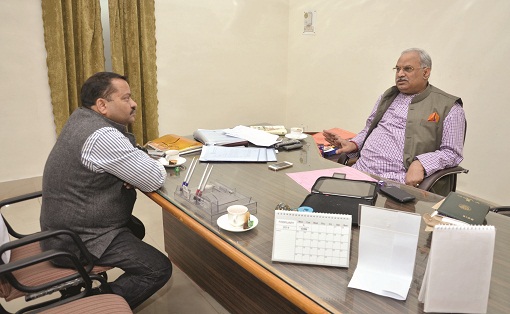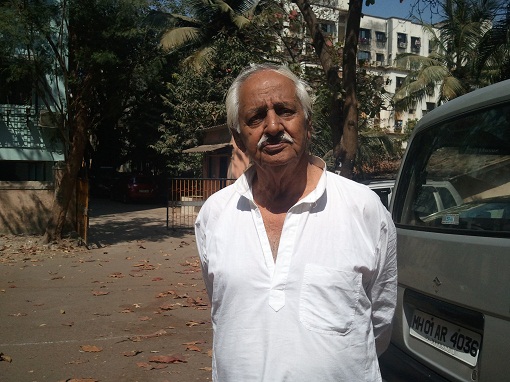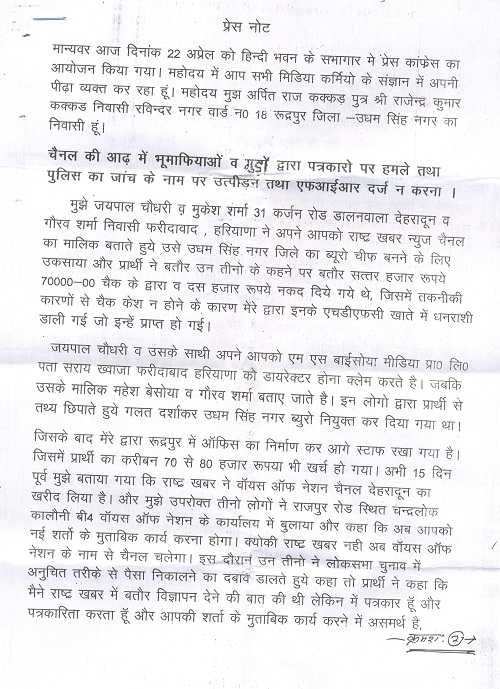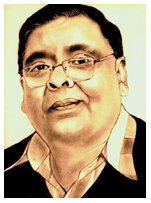INS President Ravindra Kumar (ToI March 3) was building up a case for nullifying all the elaborate institutional work that went on for more than three years behind the Majithia wage boards’ recommendations regarding emoluments of newspaper and news agency employees, journalists and others. Having lost the last ditch stand against this revision coming after 12 years, he is now crying wolf characterizing the Supreme Court’s judgment on February 7 as “judicial euthanasia”.
It should surprise none that after fighting the wage revision for three years in the Supreme Court and employing the cream of legal talent with 12 senior advocates to defend its petition, the INS President is now suggesting that the industry is facing “an existential crisis” following the apex court upholding the Majithia recommendations and government notification on them and directing the employers to start paying the revised emoluments from first of April, 2014.
There should be no surprise at this tactic to raise the anti-wage revision bogey of industry collapsing because every time a wage board revised wages for working journalists and others in the industry. The INS has been raising this same bogey for the past 50 years. The fact is that instead of the industry sinking it has been rising to the stratosphere. Just within 1998 and 2008 when the wage revisions recommended by the previous board headed by Justice R. K. Manisana Singh were legally binding on the employers, the newspaper industry virtually doubled both its readership and gross revenue as was discovered by the current wage board headed by Justice Majithia.
The two national industry bodies, the CII and the FICCI in their studies on the media situation have also underlined the growth and future potential of the print media as well. Independent experts like Mrs Vinita Khandekar-Kohli in her study “The Media Business” have upheld the same view. It is also evident from the fact that successive wage boards found that in 1990 the gross revenue of a newspaper group in the highest category was a little above Rs 100 crores; in year 2000 it was Rs 600 crores and in 2010 it was Rs 1000 crores and above and the number of newspaper groups in the highest income category also had risen from one to three. Similarly in the lowest income group, the floor level rose from Rs 0.25 crores to 0.30 crores and then went up to Rs 1 crore.
Significantly, the newspaper industry played truant before this wage board when it demanded financial data about newspaper establishments from the various newspapers in writing several times. Convinced on the basis of voluminous evidence produced by the Government and employee representatives the court not only found the employers evading giving the data but took them to task for this tactic. This is what the apex court observed:
“We are of the view that the petitioners cannot be allowed to take advantage of their own wrong and impugn the recommendations of the wage boards as not being based on their data when they eluded to submit the said data in the first place.”
It was evident therefore that the fault was not with the wage boards or the courts it was with the newspaper industry itself and its spokesman the INS. For instance, against the claim of Mr. Ravindra Kumar about his organization and the industry “are quite capable of determining solutions and imposing them on ourselves” the fact is that before Justice Majithia the INS pleaded its helplessness in forcing its members to provide the data the boards needed saying that INS could not compel its members and compliance by them to requests by it could only be voluntary. It is also significant that the INS members had claimed before the apex court that both INS and its members did not get the copies of the Majithia recommendations. However, documentary evidence proved that INS did get the copy and submitted an elaborate reply to it. This much for the organisation’s loyalty to facts.
Mr. Kumar in his piece has alleged that the Majithia recommendations, and the Government’s notification on them have breached a “sustainable model of wage determination” and “is a prescription that is far divorced from even the newspapers’ capacity to earn.” The fact is that the top legal talent hired by the industry before the apex court despite three years of arguments failed to satisfy the court on this. The court observed: “we are satisfied that comprehensive and detailed study has been carried out by the wage board by collecting all the relevant material for the purpose of wage revision. The recommendations are arrived at after weighing the pros and cons of various methods in the process and principles of wage revision in the modern era. It cannot be held that the wage structure recommended by the Majithia wage board is unreasonable”.
It is evident that the bulk of the newspaper industry sought to sabotage the wage revision by denying the statutory Majithia board the detailed financial data and analysis that it wanted from the employers. After the recommendations were notified by the Government the industry tried to raise the issue of natural justice being denied to it on the basis that not enough data was used by the board. The moment the apex court discovered this subterfuge their case in the court collapsed. Instead of now accusing the result as a “judicial euthanasia” the INS president must do some soul searching. The newspaper industry in its dailies wants everyone else to be transparent with their state of affairs and decision making in public interest. In all fairness INS should have insisted that the industry applies this call for transparency to itself first. Charity, Mr. Kumar, more so in this digital age, begins at home.
Mr. Kumar’s attack on the Working Journalists Act and on the statutory mandate to constitute wage boards from time to time to determine emoluments of working journalists as “obsolete”, “discriminatory” etc, has been a long standing litany of the newspaper industry. Right from the promulgation of the Act, it has been challenged several times in the apex court and each time that challenge claiming it was unconstitutional and erodes freedom of expression, etc., has been thrown out by the apex court.
This time too not only the court has upheld the constitutionality of the Act but found that the rapid growth of the electronic media to which the Act does not apply as yet, “substantiates the very necessity of a wage board for working journalists and other newspaper employees of the newspaper industry should exist.” To demand that the Act should be repealed just because the employers do not like it, and then to raise Armageddon over the apex court rejecting it pointing out that the court must be fair to employees also, is to demand that employers should have veto power over any regulation of employment conditions. We wonder how the INS as a “responsible” organization as Mr. Kumar claims it to be, can subscribe to such a theory of veto power for itself over what Parliament of India enacts in its wisdom as the country’s law, an Act that has withstood repeated challenges for half a century?
Several public figures and institutions have raised grave concerns over the print as well as other media coming increasingly under corporate influence. The INS stand as articulated by Mr. Kumar seems to underline that concern. The Press as an institution is always expected to campaign for infusing high ethical and liberal values in public discourse. It is time that the INS as the industry’s authentic voice is always vigilant to ensure that the industry applies these ethical and liberal values for itself first.
After all in UK, the fountainhead of liberal democracy, what happened in News of the World and in the media empire of its owner, forced the Mother of all Parliaments to intervene and institute a charter to ensure the media’s integrity that inter alia protects the rights of working journalists within newspaper organizations. We hope that the INS takes lessons from it in time for the benefit of democracy here too.
M S Yadav
General Secretary
Confederation of Newspaper and News Agency Employees’ Organisations
PTI Building, 4, Parliament Street
New Delhi-110001
Ph: 011-41394432, 4466.
PRESS RELEASE
संबंधित खबरें…
इंडियन न्यूज पेपर सोसाइटी के समारोह में राष्ट्रपति ने पेड न्यूज पर चिंता जताई
xxx
रवींद्र कुमार का बयान आपत्तिजक : मजीठिया मंच





